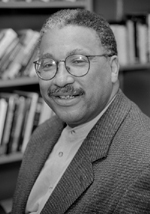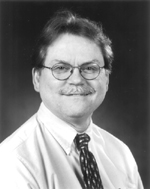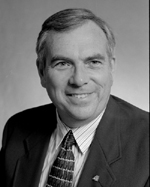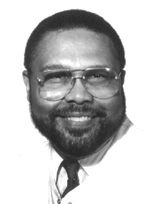By Bernie DeGroat
News and Information Services
Five individuals have been chosen to receive the 2000 Harold R. Johnson Diversity Service Award. The award recognizes faculty whose service contributes to the development of a more culturally and ethnically diverse campus community.
Named for the former dean of the School of Social Work, the $5,000 awards are given annually to full-time tenured and tenure-track faculty members to further their personal research, education and creative activities.
This year’s recipients are Lorraine M. Gutiérrez, associate professor of social work and of psychology; James S. Jackson, the Daniel Katz Distinguished Univerity Professor of Psychology and professor of health behavior and health education; Terrence J. McDonald, professor of history; Robert E. Megginson, associate professor of mathematics; and Emerson Robinson, professor of dentistry and of dental public health.

Gutiérrez directs the Detroit Initiative, an innovative program she helped develop that places undergraduate students in community-based organizations in Detroit. Many of these organizations specialize in services and advocacy for underserved minority groups.
In addition, Gutiérrez closely supervises the research of many graduate and undergraduate students of color, serves as a mentor to minority students in the Undergraduate Research Opportunities Program, and has developed a new concentration in the School of Social Work to prepare graduate students for working collaboratively in multicultural teams with community organizations.
“Dr. Gutierrez is a central faculty member in a wide range of multicultural educational activities across the campus,” says Patricia Gurin, professor and chair of the Department of Psychology. “Her teaching brings to [students] an understanding of the economic, political and cultural qualities of Latino, African American and Arab communities in Detroit, as well as an understanding of multicultural relationships within and across these communities.
“Because she superbly applies theoretical work on intergroup relations to specific communities, her students go away with a deep understanding of ethnicity in urban settings.”

Jackson, who is internationally known for his research on the effects of race and racism on mental and physical health and aging, has edited and written several books on African Americans, including Life in Black America and Aging in Black America . He also is the director of the Program for Research on Black Americans at the Institute for Social Research (ISR), as well as director of ISR’s Research Center for Group Dynamics. In addition, he is interim director of the Center for Afroamerican and African Studies (CAAS) and directs the African American Mental Health Research Center.
“James is no stranger to diversity efforts on campus,” says LS&A Dean Shirley Neuman. “While serving as an associate dean at Rackham from 1987–1992, he revolutionized the recruitment of graduate students of color and has served his department, the College and the University in a wide variety of diversity efforts since then.”
Neuman says that Jackson’s decision two years ago to head CAAS after its director resigned has had an enormous impact on diversity at the University. While interim director, he strengthened the Center’s faculty partnerships with other departments and launched an ambitious faculty recruiting drive, resulting last fall in the largest cohort of faculty to join CAAS.
“In spite of his punishing international schedule, James has put in the time and generated enthusiasm to completely transform the momentum in CAAS,” Neuman says. “[His] work is such an important contribution to diversity in the College and University that I feel very strongly that it should be recognized.”

McDonald, who also is LS&A associate dean for academic affairs and a faculty associate at ISR’s Center for Political Studies, is a leading historian of the American city and urban public policy.
In the late 1980s, he led the effort to rebuild the field of African American history in the Department of History, and he was instrumental in the passage of LS&A’s race and ethnicity course requirement in 1991.
According to Neuman, McDonald’s public commitment to diversity issues was a major reason for his administrative appointment at LS&A.
“In this capacity, Terry supervises all the recruitment, retention and promotion in the College,” Neuman says. “He has made the recruitment and retention of senior women and faculty of color a top priority of his associate deanship and the numbers show significant improvement in the five years he has been involved in this effort.
“In both his academic and public life (as an Ypsilanti city council member), Terry has made diversity a central personal value and an institutional commitment that has brought about real results.”

Megginson, who directs the University’s Mathematics Laboratory, is one of the nation’s leading advocates for minority students in mathematics education. He is co-chair of the Mathematical Association of America’s (MAA) Committee on Minority Participation in Mathematics, serves on the MAA’s Strengthening Underrepresented Minority Mathematical Achievement task force, and is a member of the U.S. Bureau of Indian Affairs/Mathematical Association of America Collaborative Program Oversight Committee.
He also has served on the U-M President’s Advisory Council on Multicultural Affairs, Advisory Council for the 21st Century Program, SACUA Committee on a Multicultural University and King-Chavez-Parks/Minority Outreach Committee, and is faculty adviser to the U-M Student Chapter of the American Indian Science and Engineering Society.
“Bob is someone who applies his skills and insights both on and off campus,” Neuman says. “He has played a special role with students at Turtle Mountain Community College in North Dakota, [which] is controlled by the Turtle Mountain Band of Chippewa Indians and, most recently, played an invaluable role in working with students concerned about the Michigamua issue on campus.
“Our College and campus is quite literally a different place with Bob than it would be without him. His local and national contributions to diversity are deeply impressive.”

Robinson, who teaches prosthodontics at the School of Dentistry, serves on the dental school’s Committee on Diversity and Excellence. He recently was the school’s interim director of minority affairs, counseling minority students, faculty and staff, as well as leading efforts to recruit minority students and faculty.
In addition, he has served on what is now the dental school’s Multicultural Affairs Committee, as well as on the U-M President’s Advisory Commission on Minority Affairs and Martin Luther King Jr. Symposium committees.
As a public health dentist, Robinson devoted much of his early career to providing care to underserved populations through community dental efforts. More recently, his career has focused on clinical teaching, using his scholarly knowledge to help minority students and faculty pursue careers in dental education.
One of his major accomplishments was developing a major symposium, “Black Dentistry in the 21st Century,” which resulted in an award-winning book by the same name.
“By word and by deed throughout his distinguished career, Dr. Robinson has contributed professionally and personally to the development of a more culturally and ethnically diverse campus community at the School of Dentistry and the University,” says William Kotowicz. “He has emulated the spirit of Dr. Harold Johnson, working both behind the scenes as well as in many highly visible roles so that all persons have equity as they strive to realize their aspirations.”

